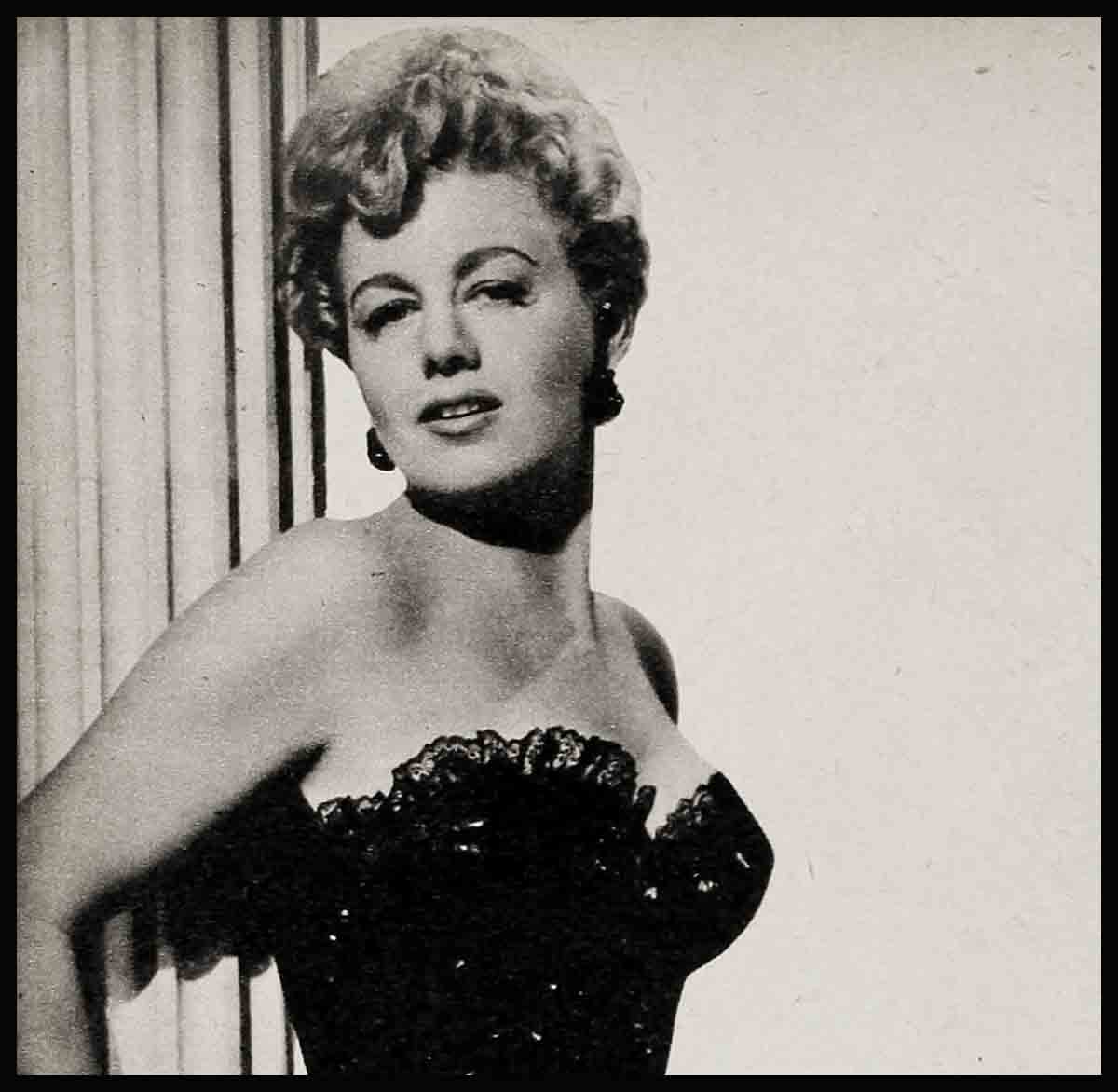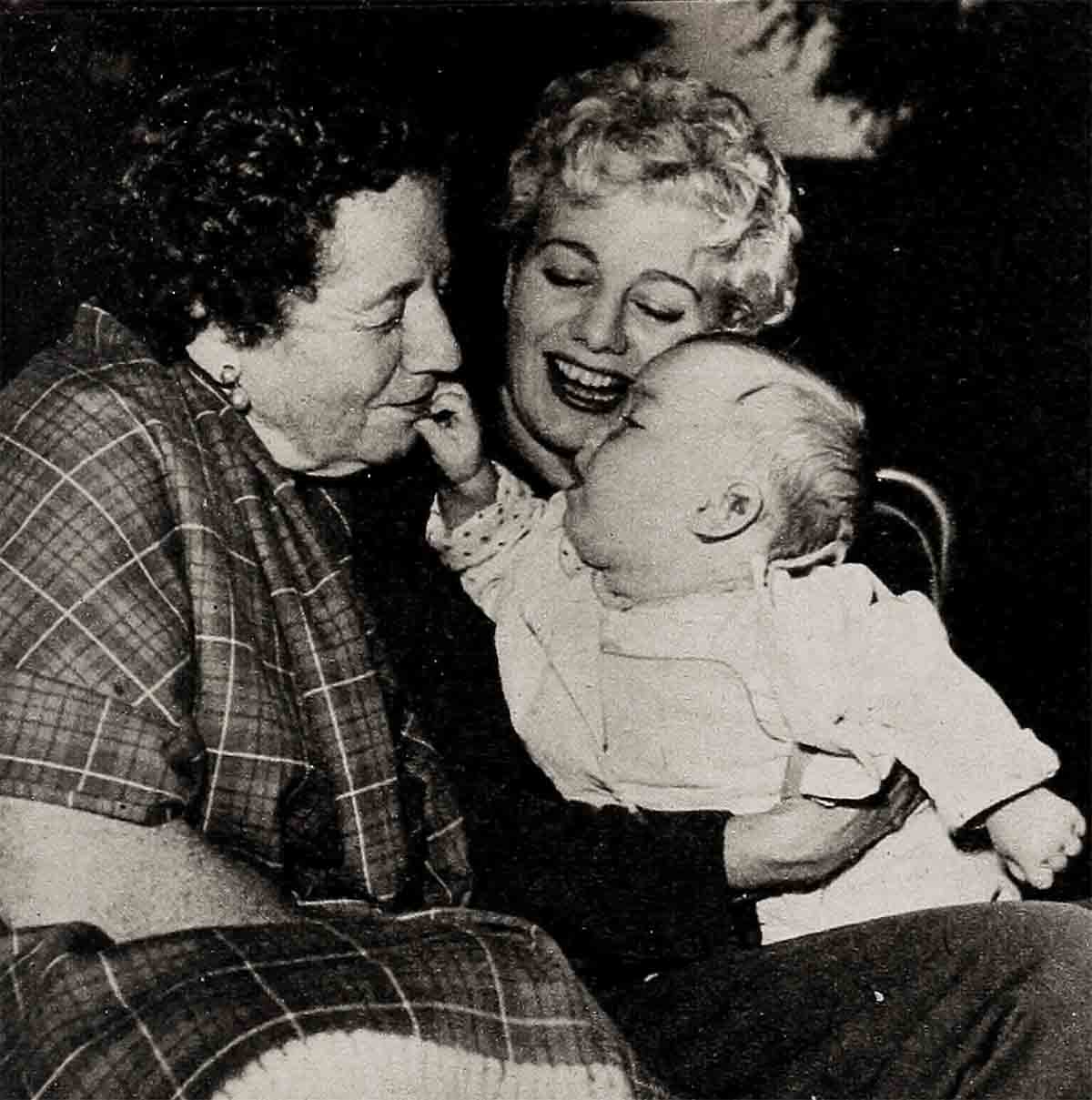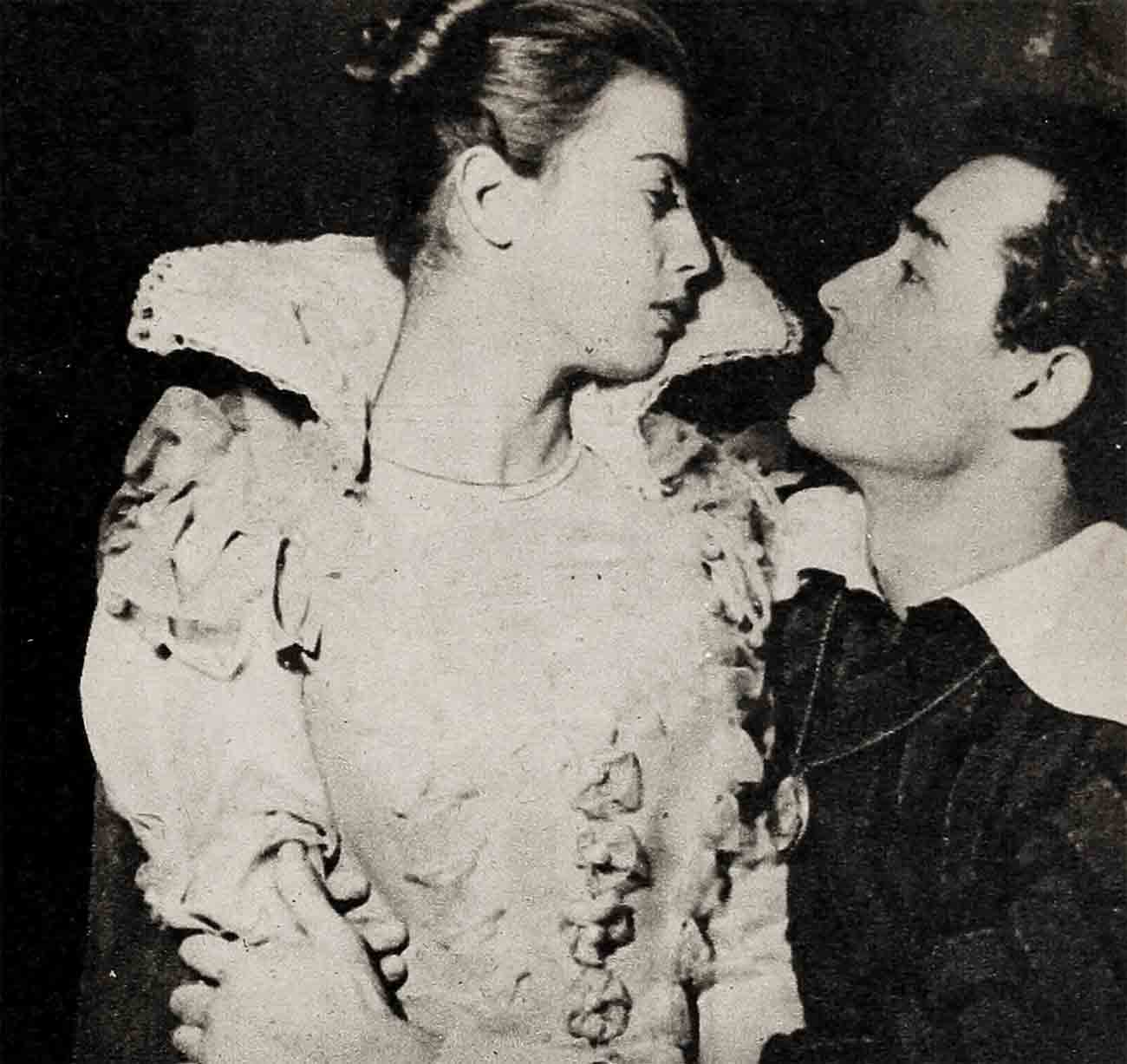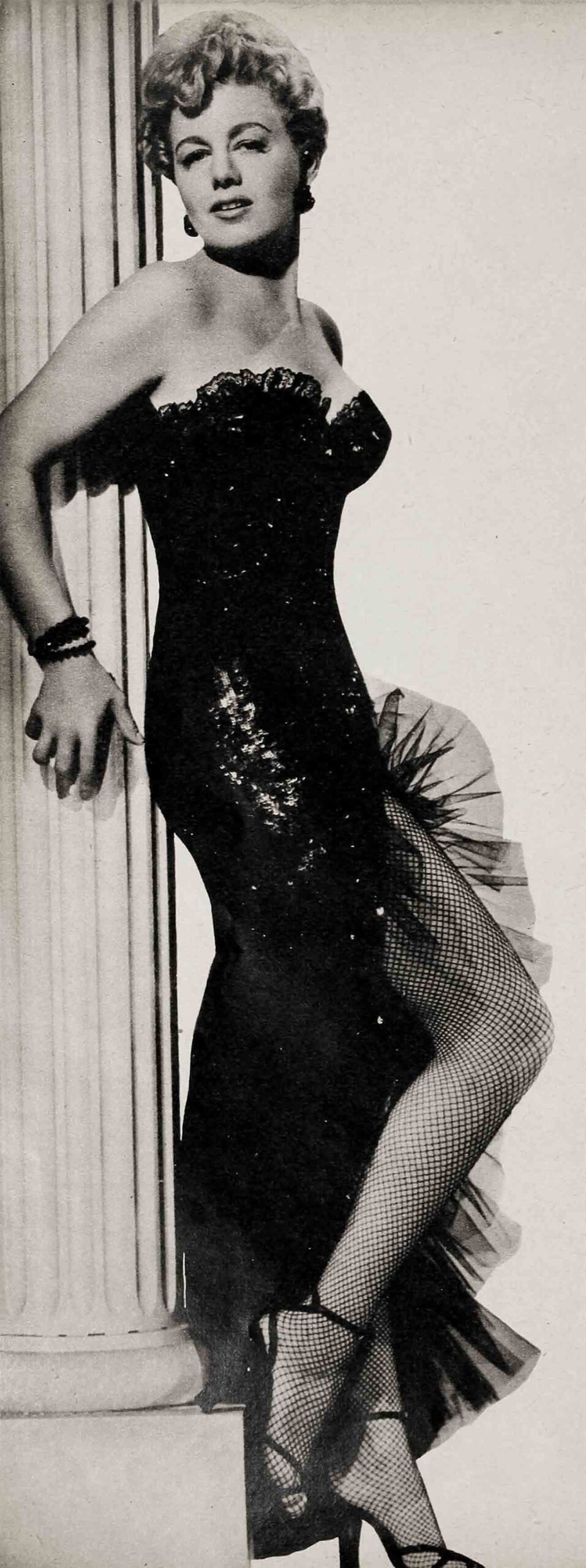
Marry The Girl!— Shelley Winters
In her room in Rome’s fashionable Hassler Hotel, Shelley Winters had cried her heart out the night before. Now there were no tears left, only pain, anger and the soul-racking hurt of a rejected woman.
Defiantly, Shelley turned to the reporters at her press conference. Her eyes flashed as she spat out her announcements.
“Tomorrow morning,” she said, “I’m having my lawyers file for legal separation from Vittorio Gassman. The suit will be filed in Los Angeles.”
“Are you Catholic?” Shelley was asked.
The blonde firebrand shook her head.
“Then, why a separation? Why not a divorce?”
“I’ll divorce Vittorio,” she virtually shouted, “just as soon as he pays me $95,000. And he’ll have to guarantee in writing that right after the divorce he will marry Anna Maria Ferrero.”
The reporters looked at each other in consternation.
“Does your husband owe you $95,000?” one of them asked.
“I want $5,000 a year for my little girl until she’s eighteen years old.”
“But that’s only $90,000,” a newsman interjected. “What’s the other $5,000 for?”
“Expenses,” Shelley snapped. “My daughter is now ten months old, and I don’t want her to know Vittorio or to love him because all he would do would be to neglect her and break her heart.”
The photographers at this point began to shoot. Shelley held up her hand. “Please,” she said. “You’ll have to shoot from the left. I have a bad eve and I don’t want it to show.”
“Is that the result of too many tears?” a reporter asked.
“It’s a little infection,” the actress said.
“Do you want your daughter to grow up without a father?”
Shelley thought for a moment. “I’m sure I can still find a better man to be a day-to-day father to her and accept his responsibilities.”
“Didn’t Mr. Gassman accept his?”
“No,” Shelley said flatly. “He did not.”
“Isn’t it true,” one reporter interrupted, “that you and your husband started this whole fight because you didn’t like the way he played Hamlet in Genoa last week? Isn’t it merely an artistic difference? That’s what your husband told us in Padua.”
Shelley bristled. “I know. That’s what he’s been saying, and it’s not true. He asked me to say nothing, and until now, I haven’t. But he’s been running off at the mouth, giving out lengthy statements.
“I guess his business is bad, and he needs the publicity. But I’ve been made out to be the heavy. I’m not.

“Two years ago when I met Vittorio he told me that he was one of the greatest actors of our time. I believed him. He told me that he was as good as Laurence Olivier and almost as good as Barrymore. I told this to everyone in Hollywood. I even hired a press agent to tell the people I couldn’t tell.
“But our fight is not about artistic interpretations or how he plays Shakespearean characters. He has made it seem that I wanted a divorce because I didn’t like his work. That’s ridiculous. He has placed me in a very unglamorous position because of an eighteen-year-old girl.” Shelley referred to Anna Maria Ferrero, Gassman’s leading lady in his stock ‘company. Actually Miss Ferrero is only seventeen.
Long before Shelley arrived in Rome after the Christmas holidays, it was rumored that Vittorio was quite taken with Anna Maria and she with him. When Shelley insisted that she would not divorce Vittorio without his promise to marry Signorina Ferrero, people started asking questions. Embarrassing questions.
Had Gassman compromised the seventeen-year-old dark-haired Italian beauty? Once she divorced Vittorio, was it any of Shelley’s business whom he married?
In Milan where Anna Maria was working with Vittorio, each of them made it clear to the press that Shelley’s unusual protection of Miss Ferrero was unnecessary.
In Hollywood, Jonas Schrift, Shelley’s father, tried to explain his daughter’s demands.
“Shelley has always been for the underdog,” he said. “She always wants to help people. I can’t tell you how many starving actors she’s supported.
“If she insists. that Vittorio has to marry this girl she must have a reason. She can’t stand injustice, my Shelley.
“I was puzzled, too, when I read that she wanted Vittorio to marry this Ferrero girl. I asked myself why.
“The answer must be that it is the right thing for Vittorio to do. I’m sorry that this marriage hasn’t worked out. He’s an intelligent boy, this Gassman. Very cultured. But he’s European. You know how those Europeans are. They don’t believe a woman should be treated as an equal. My Shelley says what’s on her mind, what’s in her heart.
“She was, very much in love with this fellow. But after all, he’s an actor. You know how actors are. The whole world revolves around them. Very selfish, these European men.
“My Shelley, she says what she means and she means what she says. At least she has a wonderful girl out of the marriage. Of course the baby from the nose up looks just like the father. But even so, she’s a wonderful child. Not because she’s my grandchild. Ask anyone. You just have to look at her and you know that she is a superior child.”
In Milan Gassman heard Shelley’s stipulations for a divorce: (a) $95,000, (b) marriage to Miss Ferrero, (c) abandonment of all visitation rights to his daughter. He clenched his teeth in anger, his face reddened and for a few moments he couldn’t talk.
When he could, he exploded. “Absurd! Who ever heard of such a thing! She must be out of her mind. I don’t object to her financial demands. But this business of not letting me see my own child is crazy.

“As for my marrying Miss Ferrero, why, that’s absurd, too.”
“Maybe you and Shelley will reconcile,” a reporter suggested.
“Not likely,” Gassman snapped. “Not after this.”
“I am a friend of them both,” interrupted Pietro Ardenzi, Gassman’s manager, “and I will try to reconcile them. But many of these things Mrs. Gassman has said about her husband are not true. Not true. He has never used a publicity agent in the United States. Vittorio is a great artist. You cannot deny such a man the right to visit his child.”
When Shelley read her husband’s statement, she summoned reporters again and told them that she would fight tooth and nail and exhaust every legal possibility to retain complete custody of her child.
“Vittorio was too busy acting on the stage in Italy even to come to Los Angeles when Vittoria, our little girl, was born,” she thundered. “Then he finally did come. He stayed with us for a couple of weeks, and in all that time, he played with her maybe for five minutes.
“It has always been his work—his work and himself—that mattered. Nothing else.
“Why, I had to throw his clothes out on our front lawn before he finally agreed to take out any life insurance. There isn’t a judge living in America who would give him custody of the child after I get through testifying.”
While Shelley was discussing the legal aspects of the case, her attorney in Los Angeles, foxy old Jerry Geisler was saying nothing. Instead, he drove down to the Superior Court House in Santa Monica and unobtrusively filed, on behalf of his excitable client, a suit for separate maintenance.
In that suit Shelley charges mental cruelty and agrees that her husband is entitled to reasonable visitation rights. She wants custody of the child, which is all right with Gassman.
The truth of the Shelley-Vittorio battle is that Anna Maria Ferrero had little to do with it, although she undoubtedly roused Shelley’ s jealousy. Before Shelley left for Rome, she had a pretty good idea that her marriage was finished. She had battled with Gassman all over Beverly Hills, accusing him of selfishness, egoism, back of consideration, conceit and a dozen for two additional inadequacies as a husband.
Most of all, she could not tolerate Vittorio’s seemingly cold attitude toward their child, about whom she is completely daffy.

Gassman is not an emotional man. “I don’t get excited,” he once said. “I am logical and self- controlled. Shelley is just the opposite. I put my work first. A man does not throw away his life for love or the lack of love. My work dictates to me how I must live. My work, not my love.
“I always have been calm. I practice intellectual control. Other people say that show business is hectic, all mixed up. Not for me. I like to know what I am doing and what I am capable of doing.
“To me love does not mean childish things. It means companionship. But I cannot remake Shelley’s personality, and she cannot remake mine.”
Vittorio has another daughter, Paula, eight, by a previous marriage, and although she lives in Rome, Vittorio’s headquarters, he sees relatively little of her. He is always working. As a member of his troupe put it, “He is married to the stage. He is not the perfect father.”
Shelley tried to mask her feelings but when Vittorio failed to show up for the birth of their child last February she was badly hurt.
She felt in her heart that he no longer cared for her. Perhaps she was right. Apparently, she has always loved him infinitely more than he loved her. The sad part of it all is that she still loves him.
Perhaps by now they have reconciled or are planning to. Certainly it’s not beyond them. Shelley will take her Vittorio on practically any basis, even one which permits him the privilege of being a part-time husband, which is exactly what he has been.
Shelley’s lawyer, Jerry Geisler, admitted that “Shelley is still in love with that guy. I think she hoped for a reconciliation when she went to Italy. That was my understanding. But after she left this country in December I didn’t hear from her.
“Not until the middle of January. Then she called from Rome and said, ‘Go ahead with the suit. I want you to file it first thing Monday morning.’ ”
Gassman has said many times that Shelley, a great saleswoman, has tried to Americanize him too quickly.
“She wants me to dress like an American, to talk like an American, even to drive like an American. After all, I am a human being, entitled to retain my own nature.
“The demands of my work have kept me very busy. But in eighteen months I have spent $3250 in long distance calls to Shelley and more than $6500 in plane tickets. How much can you ask of a man?
“I cannot help it if the movies I have been in have been shot in Mexico and New York. I cannot tie myself to Shelley’s apron strings.
“That I love our daughter just as much as Shelley does, I swear. I cannot get as emotional about her as Shelley does because that is just not my nature.”
Shelley and Vittorio were an unlikely combination from the beginning. It is not true that Vittorio married the blonde bombshell merely to gain entrance to the United States and Hollywood. But perhaps their great love for each other wasn’t quite that.
Shelley was ripe for marriage. For years she and Farley Granger had been involved in a phony love affair for publicity. She had really loved Marlon Brando and Liam O’Brien. Those loves came to nothing in 1950 and 1951. She had played according to their rules, and was left with memories, presumably not happy. The happier Shelley’s professional life, the emptier her private one.
In November, 1951, when supposedly she was touring Europe with her “Farfel,” her favorite name for Farley Granger, she left him and flew to Rome. Frank Lattimore, the English actor, introduced her to Vittorio.
He moved in quickly, with charm and tact. Poor Shelley’s Hollywood romances had hardly prepared her for such an approach.
Gassman took Shelley to the Passeto, then to the Caballa, another wonderful little café on the banks of the Tiber. He introduced her to his mother and sister. Soulfully, he confessed that although he was separated, he was still married to the daughter of Italian actor Renzo Ricci. He told her about his seven-year-old daughter, Paula. He told her how he had been drafted into Mussolini’s army. It wasn’t long before Shelley was giving out with her biography. They stayed up until five-thirty A.M.
They spent one week together in Rome. In that one week, Shelley fell for Vittorio like an atom bomb. When she got back to the States, she sent him a cable: “I’m lonely and I’m sending you a kiss.”
“I’m lonely, too,” he cabled back, “and I’m returning your kiss.” Then he walked down to the TWA office in Rome and got a reservation on a flight to Los Angeles.
When he turned up in Hollywood, Shelley was overjoyed.
“But I can only stay six days,” Vittorio said.
“You mean you flew six thousand miles just to spend less than a week here?”
Vittorio nodded.
“It must be love,” Shelley cracked. And she really felt that way. She took Vittorio around to all her friends, showed him off with great pride. Before he left to make a film in Spain, they discussed his impending annulment and their subsequent marriage—by proxy in Mexico, or a regular marriage in Mexico. Shelley wasn’t sure of the details. “All I know is that I’m going to marry him.”
Vittorio is sharp and observant. In his first week in Hollywood he learned a lot about Shelley. He saw that she was aggressive and verbose in order to hide her insecurity. He learned that childhood rejection lay behind her unbridled ambition.
Stories of her childhood in St. Louis and Brooklyn meant relatively little to him but he was impressed because Hollywood respected Shelley as an actress. Maybe she was sloppy; maybe her posture and her frankness left much to be desired. But certainly she was a grade A actress.
To Vittorio that was 90%. He loves talent.
Shelley was nominated for an Academy Award for her performance in A Place In The Sun and that, too, added lustre.
Vittorio was sure he was right in obtaining his annulment. Presently Shelley joined him in Italy. Then they flew to Hollywood and when the annulment came through, down to Juarez, Mexico, where they were married. This was in April, 1952.
People are optimistic everywhere, but especially in Hollywood. They believe that marriage changes the partners involved. It doesn’t change their basic personalities, although after her marriage Shelley kept saying, “I’m a new person, a new woman. Honestly. You have no idea how much I’ve changed,” she elaborated. “I guess it’s because I’m in love with an extraordinary man. He’s given me security. For the first time in my life I have security.
“I’m not so frantic any more. I wasn’t upset when I didn’t win the Academy Award. Two years ago I would have cried my eyes out. Now I just don’t care. I see everything in its proper perspective.
“Remember how scared I used to be about money, how frightened when they took me off salary? Now, I don’t worry. I have someone to take care of me, and he’s just wonderful. In all the time we’ve been together we haven’t had a single fight.”
Soon the fights began. Shelley tried to get Vittorio to take an American haircut. “Those Italian barbers cut hair so funny,” she said. Vittorio told her to mind her own hair.
She said she loved Italian food and was going to specialize in learning how to prepare it. Vittorio said, “Never mind. I really prefer French cooking.”
In a little while it became obvious that he preferred Italy to California. He agreed to sign a contract at MGM but only if he could have six months free to return to Europe and his stock company.
Shelley, of course, went all-out for her new husband. She praised him to the skies. She took advertisements in the trade papers. She told everyone who would listen that he was the greatest actor Italy had ever produced. She clung to him with a desperation that was almost pitiful, as if she secretly knew that her time and her happiness with him was limited.
There were many quarrels. Presently, she was pregnant. It was a miserable pregnancy, and most of the time Vittorio was out of the country. When the child was finally born, she almost choked to death and had to be put into an incubator. Shelley needed help and encouragement and a husband. But the husband was 6,000 miles away.
“Shelley is a mature young woman,” Gassman told a reporter. “I know she will understand. I will be in Hollywood in a few weeks.” His encouragement was entirely by telephone.
When Vittorio arrived last spring and saw his daughter, Vittoria Gina, for the first time, he was pleased but not over-demonstrative. Shelley was bitterly hurt. In a voice that might have been heard in Cucamonga she gave vent to her feelings. Vittorio began to look at timetables. He went to Switzerland after he finished Rhapsody with Elizabeth Taylor. Then he told Shelley he had to return to Rome. She recognized an awful truth—that her husband seemed always anxious to leave.
Hollywood suspected last December that the marriage was almost over, but Shelley publicly refused to admit its failure. After Vittorio left town she insisted that their relationship was excellent and that she would follow him in a few weeks and that they would co-star in a picture, Mambo.
Then, just before she left for Rome, she asked Jerry Geisler to draw up separation papers and hold them until she telephoned from Europe. If she didn’t phone, everything was fine. She and Vittorio had worked out their differences. If she did phone then Geisler would file the suit.
On January 16, the call from Shelley Winters in Rome came through.
THE END
—BY STEVE CRONIN
It is a quote. MODERN SCREEN MAGAZINE APRIL 1954





No Comments